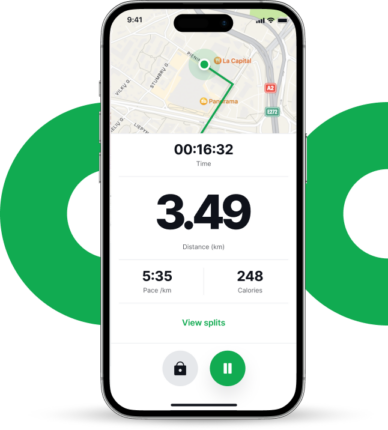Is running bad if you’re overweight? Not at all. A consistent running routine is one of the best ways to lose weight and boost your overall health. Running for overweight beginners may seem challenging at first. Extra weight may stress your joints and make you feel out of breath faster, but this shouldn’t discourage you from starting.
These issues are manageable, and the health benefits outweigh the cons. Once your workouts have structure, the results can be outstanding. And the best part is that you’ll feel great.
In this guide, we’ll cover things to consider before starting a running program when you’re overweight and running techniques for overweight beginners. We’ll also share a plan for overweight runners to help you get started the right way.
So, let’s dive in!
In This Article
In This Article:
Important Steps Before You Start Running as an Overweight Beginner
Your running journey starts with a shift in mindset. This may include a new approach to losing weight in a natural way and eating healthier so that you’ll use the right food as fuel.
Before you tie your shoelaces, there are a few important steps to consider. Your long-term health and the success of your running journey may depend on them.
See your doctor
You may be wondering, “how heavy is too heavy to run?” or “can overweight people run?” It is best to let your doctor evaluate your fitness level and give you some helpful advice before you start running.
Extra weight can put a strain on your joints, so you may want to start slow. Discuss your running goals and plan your weight loss journey with your doctor for a safe start.
Pay attention to these things:
- Any history of a heart condition, including high blood pressure
- Kidney health
- Any respiratory diseases (including asthma or lung diseases)
- Joint issues (such as arthritis and trauma history)
- Current medication
- Any other pertinent issues in your medical history
If you have pre-existing conditions, discuss them with your doctor. In most cases, these will not prevent you from running, but your doctor may make useful suggestions.
If you are concerned about your cardiovascular health, you could do an exercise stress test for peace of mind.
Get proper clothing and running shoes
Having the right gear makes running easier and more enjoyable and boosts your running performance. Proper running shoes, in particular, can make a big difference if you are overweight, as they can lessen the stress that your body puts on your feet and leg joints.
Activewear should be as comfortable as possible. It should allow your skin to breathe and prevent chafing as you exercise. Try to avoid cotton and opt for wicking technical fiber instead. DryFit, Thinsulate, Thermax, CoolMax, polypropylene, or silk are great options.
Compression gear can boost your performance and help tired muscles, too. This type of activewear is designed to increase blood circulation in the limbs, delivering oxygenated blood to the muscles and reducing lactic acid buildup.
Tip: Another advantage of investing in running gear is that it provides a psychological cue and helps you form a running habit. When you put it on, you know it’s running time, and that triggers running mode and motivates you to run more often.
Understand hydration
Running means sweating, and sweating depletes your body of electrolytes, which are essential minerals. When you become dehydrated, it’s not just your performance that suffers. You can get muscle cramps, headaches, and other unpleasant symptoms that can be demotivating.
Plain water takes care of hydration, but sports drinks or running supplements also provide electrolytes. Staying hydrated on the trail gets easier if you get a handheld running bottle or runners’ vest, or waist belt with a bottle holder.
Start a healthy diet
Healthy choices in the kitchen – and outside of it – can boost your running results. This doesn’t have to mean going on a strict diet.
Ideally, you want to help your body lose weight while providing it with enough fuel, nutrients, and proteins to become stronger. A runner’s body has higher protein and nutritional requirements than that of a sedentary person.

It’s a good idea to review your diet and check how many calories you consume daily from which foods. Try to replace any processed foods with whole, fresh ingredients, as close to their natural state as possible.
Here are some ideas:
- Trade your bagel sandwiches for eggs at breakfast. An egg breakfast can enhance weight loss when paired with a low-calorie diet.
- Eat a high-protein diet to improve blood glucose levels and help you build lean muscle mass. Increase your protein intake by up to 30% of your calories by eating low-fat yogurt, lean meat, legumes, nuts, and seeds.
- Hydrate by drinking water and eating fruits instead of soft drinks.
- Use the plate method: ½ fresh vegetables, ¼ lean protein, and ¼ carbs such as whole grains.
- Replace unhealthy fats with oils rich in omega-3 fatty acids, such as olive oil.
Remember: As your training intensity increases and your physical fitness improves, don’t forget to adjust your calorie intake accordingly. Frequent running can burn calories at a high rate, and it is important to stay well-nourished. Don’t be tempted to skip meals, as this will encourage your body to store more fat and will contribute to weight gain.
Set the right goals
Unrealistic running goals mean you may quit the strain after only a few runs. But you don’t want to set laid-back goals either. The sweet spot is to challenge yourself enough to see constant progress while avoiding injuries and other health problems.
First, form a healthy habit of regular physical activity. You could aim to walk 10,000 steps a day in the beginning. Then, consider running plans suitable for your level and create your training schedule in line with your weight loss goals. That way, you can create realistic goals and stay motivated throughout your running for overweight beginners journey.
Running Plan for Overweight Beginners
Now that your preparations are done, you may wonder how to start running.
Following a 6–12-week running plan for overweight beginners will give your runs the structure you need to see results and keep you motivated.
At the same time, this type of plan won’t be as demanding as longer plans. You can walk first to get in better shape and then mix in short jogging or walking intervals into your weekly routine before moving on to full runs.
Your running plan can include cardio exercises, yoga, swimming, cycling, weight training, strength training, Pilates, and different workout routines for endurance and stamina.
Once you start running consistently and your running form and running technique improve, you can start thinking about your first 5K. Can overweight people run such a distance? That will depend on your weight, but with good 5K preparation, it is a reasonable goal for most beginners.
Warm-up and cool-down routines should be built into your plan, as should rest and recovery periods. Rest days are important because they prevent injuries and help the body adapt to increased levels of physical activity, especially for overweight runners.
Remember: There’s no one-size-fits-all running plan. The right plan will depend on your weight, activity level, and other factors. A personalized plan can help you maximize results while enjoying every run. With our app, you can create a personalized running plan for overweight beginners in minutes.
Finding and Keeping the Motivation to Run
Do you know what often makes the difference between someone who runs and someone who doesn’t? It’s not the BMI. It’s motivation.
Where can you find the motivation?
Finding enough motivation to start and keep training means looking beyond the physical results you expect from running. Maybe you want to lose weight and become faster and more agile. That’s great. But don’t stop there.

Finding your inner drive
It might seem challenging to start running when overweight. But think of the person you want to become. Running has great transformative power, not only on your body but on your confidence, mental health, and approach to life.
Running is the opposite of sitting and feeling bad about things – it’s being active. More than that, it’s a process of understanding your body – its strengths, its weaknesses, and its potential.
Don’t compare yourself with anyone. Do it for yourself. Do it for the wonderful journey that running is. Because each time you run, you run toward a stronger, fitter version of yourself.
When you start out, visualize your goals the same way that champion athletes do. See yourself at the finish line and beyond it. See yourself stronger, faster, fitter, and healthier.
Accountability partners
Finding people to support you can make all the difference. You can team up with a running club or group near you or ask a friend or family member to join you. If you feel insecure or struggle to find someone to commit to your new workout schedule, ask someone to stay in touch and check back on you on your running days. You’ll be surprised how much having accountability can boost your motivation and results.
6 Running Tips for Overweight Beginners
Now that your motivation is building up, let’s explore some tips for getting started.

Lose some weight first
We’ve touched on this already, but it’s worth repeating. Carrying extra pounds can put pressure on your leg muscles and joints. The more weight you can safely lose before you start running, the better.
A lower BMI means you can go faster and farther earlier with a lower risk of injury. Seek help with this if you have to, whether it’s talking with your doctor or downloading and getting guidance from our app.
Warm up the right way
Running can result in muscle tears, ligament damage, and the wearing down of joints, especially in overweight runners. Therefore, warming up well before every run is essential for injury prevention.
You can go on a brisk 10-minute walk, jump rope for 5–10 minutes, or run in place for a few minutes. Try adding some hamstring raises, stretching exercises, or leg swings to create a well-rounded warm-up routine.
Run and rest
Avoid going all in at once. Repeated, intense physical activity like running can strain your body, resulting in issues such as shin splints or a runner’s knee. Run no more than 2–3 times a week so that your body becomes accustomed to your new activity levels.
Add a few rest days to your training week, especially in the beginning. Also, depending on your workouts, you can build rest periods into your runs. Your recovery days can include light activities like walking, using a foam roll, or doing mobility exercises to help your muscles relax.
Tip: Running when overweight can be tiring and challenging at first. Taking breaks will help you stay motivated, allowing you to come back to your workouts fresh and rested.
Use proper form when running
Mastering a good running form takes practice, so don’t worry if you don’t get it perfect from the start. Run tall with your torso upright, and keep your head balanced on your shoulders.
Keep your shoulders relaxed and your gaze straight. In other words, stay calm. You’re a beginner runner, not a 100-meter Olympic sprinter!
Engage your core muscles
Your abs provide the foundation for your every movement, plus stability and strength. They should also work in tandem with rhythmic breathing while you run.
You can engage your core muscles by contracting your abs as you exhale, pulling your belly button inward, and then releasing it when you inhale. On the next exhalation, contract the abs at 50% of the intensity and then at 25%.
Make gradual additions
Don’t run too much too fast. One basic rule is to gradually increase your weekly distance by not more than 10% each week. This helps you build endurance while reducing the risk of running injuries. To increase your endurance and strengthen your muscles, you can add strength training to your weekly schedule. However, always listen to your body to avoid overworking it.
FAQ
Should I run if I am overweight?
Overweight runners are often self-conscious when starting. Don’t let this stop you. Running can offer amazing health benefits for both your physical and mental well-being.
Running is an effective way to lose weight and, when performed in short, high-speed intervals, can help build lean muscle mass. It also supports mental health by maintaining a balance of serotonin and dopamine in your brain and calming the nervous system.
Even a single run or jog can serve as a meditative experience, leaving you feeling clear-headed and ready to tackle life’s challenges. Studies suggest that running may even extend your life expectancy, making it one of the simplest ways to care for your long-term health.
While it’s important to take safety precautions before starting, running can be a truly transformative journey.
Am I too heavy to run?
Before you start running, it’s important to consider factors such as your actual weight and medical history. Extra weight can put stress on your joints, bones, and tendons, potentially leading to injuries.
To begin safely, consult your doctor to evaluate your physical level and define your fitness goals. Starting with light activities like walking and adopting a healthy diet plan without processed foods can be beneficial initial steps.
Additionally, speaking to a fitness or running coach can help you understand the benefits and risks of running for overweight beginners. Their guidance and motivation will support you throughout your running journey.
How do I start running when I am out of shape?
From running gear and nutrition to fitness tips and motivation, there are a few things to consider before you hit the pavement. Most importantly, you should listen to your body and start your running journey slowly. Jumping right into it can strain your muscles, resulting in injuries like shin splints or ankle sprains.
Instead, begin by walking 30 minutes a day, a few times a week, and gradually increase your pace and distance. Your walking periods can include short intervals of jogging when you’re ready. Once you reach better shape, add some strength training to your workout schedule to strengthen your muscles and protect your joints.
This process may be slower, but it is more motivating, meaning you will lose more weight in the long run.
Takeaways
Running can be an effective way to lose weight and maintain your overall well-being, but here are a few things to keep in mind when starting running for overweight beginners:
- Consult your doctor before starting a running program to evaluate your fitness level and address any pre-existing conditions.
- Invest in proper running gear, such as comfortable activewear and well-fitting running shoes with good arch support and cushioning.
- Make healthy dietary choices to fuel your body and maintain good overall health.
- Start with walking and gradually incorporate jogging or running intervals into your routine.
- Warm-up and cool-down routines are essential for injury prevention.
You can stay motivated by finding an accountability partner or joining a running group and focusing on the transformative power of running for both physical and mental health. Set realistic goals and follow a personalized running plan to stay motivated and track your progress.
Ready to transform your running experience? Here are the perks of training with the Joggo app:
- Personalized running plan according to your goal, needs, and lifestyle.
- Personalized meal plan and selection of 10+ most popular diets.
- Educational articles and smart tips to guide you on your journey.
Take the Joggo quiz to personalize your running experience and meet your digital running coach!
References:
- Koplan, J.P., Powell, K.E., Sikes, R.K., Shirley, R.W. and Campbell, C.C., 1982. An epidemiologic study of the benefits and risks of running. Jama, 248(23), pp.3118-3121.
- Looyestyn, J., Kernot, J., Boshoff, K. and Maher, C., 2018. A web-based, social networking beginners’ running intervention for adults aged 18 to 50 years delivered via a Facebook group: randomized controlled trial. Journal of medical Internet research, 20(2), p.e67.
- Plateau, C.R., Anthony, J., Clemes, S.A. and Stevinson, C.D., 2022. Prospective study of beginner running groups: psychological predictors and outcomes of participation. Behavioral Medicine, pp.1-8.
- Buist, I. and Bredeweg, S.W., 2011. Higher risk of injury in overweight novice runners. British journal of sports medicine, 45(4), pp.338-338.
- Balcı, Ş.S., 2012. Comparison of substrate oxidation during walking and running in normal-weight and overweight/obese men. Obesity Facts, 5(3), pp.327-338.
- Drinkard, B., McDuffie, J., McCann, S., Uwaifo, G.I., Nicholson, J. and Yanovski, J.A., 2001. Relationships between walk/run performance and cardiorespiratory fitness in adolescents who are overweight. Physical Therapy, 81(12), pp.1889-1896.














